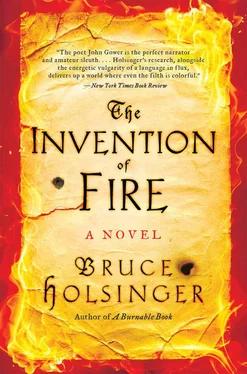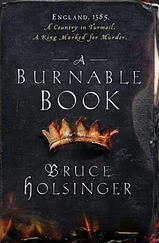Bruce Holsinger - The Invention of Fire
Здесь есть возможность читать онлайн «Bruce Holsinger - The Invention of Fire» — ознакомительный отрывок электронной книги совершенно бесплатно, а после прочтения отрывка купить полную версию. В некоторых случаях можно слушать аудио, скачать через торрент в формате fb2 и присутствует краткое содержание. Год выпуска: 2015, Издательство: HarperCollins, Жанр: Исторический детектив, на английском языке. Описание произведения, (предисловие) а так же отзывы посетителей доступны на портале библиотеки ЛибКат.
- Название:The Invention of Fire
- Автор:
- Издательство:HarperCollins
- Жанр:
- Год:2015
- ISBN:нет данных
- Рейтинг книги:3 / 5. Голосов: 1
-
Избранное:Добавить в избранное
- Отзывы:
-
Ваша оценка:
- 60
- 1
- 2
- 3
- 4
- 5
The Invention of Fire: краткое содержание, описание и аннотация
Предлагаем к чтению аннотацию, описание, краткое содержание или предисловие (зависит от того, что написал сам автор книги «The Invention of Fire»). Если вы не нашли необходимую информацию о книге — напишите в комментариях, мы постараемся отыскать её.
The Invention of Fire — читать онлайн ознакомительный отрывок
Ниже представлен текст книги, разбитый по страницам. Система сохранения места последней прочитанной страницы, позволяет с удобством читать онлайн бесплатно книгу «The Invention of Fire», без необходимости каждый раз заново искать на чём Вы остановились. Поставьте закладку, и сможете в любой момент перейти на страницу, на которой закончили чтение.
Интервал:
Закладка:
Beneath the dark cast of his words there was a strange but welcome clarity in Simon’s comparison, a sense that he had freshened the air between us with such a forthright admission.
“You will remain in the Pale?” I asked him.
“For now,” he said. “Though given what has just occurred I suggest you leave as soon as you can, and as discreetly.”
“Yes, though . . .” I hesitated. “I will need your help, as I know no one in town, nor along the harbor.”
“I will arrange for your departure in the morning. A man will come here at first light. He will get you safely through the walls, take you down to the harbor, and put you on a ship to London. You cannot go back to Broussard’s, nor to the keep.”
“No, I see that,” I said, thinking of the few things I had left in my travel bag at the wool merchant’s house: some clothes, a favorite writing tablet, a Latin book of myths and their glosses. The book would be a great loss, though perhaps I might send for it once back in Southwark. My own skin, I reasoned, was more precious than the parchment leaves making up a manuscript.
With the details of my departure settled we sat in silence. Simon had calmed somewhat, as had I, and it came to me how great a risk he had taken to acquire the information passed on to me. What I perceived as weakness in him might be instead a hidden strength, a reserve of bravery and fortitude beneath the foolish and puerile exterior I knew. Simon served the worst of men, though perhaps was on his way to becoming a better man himself.
Even as I had these sentiments I spurned them. Simon had lied to me so often and so casually that I needed to remain distrustful of every word from his mouth. Yet I longed to ask him to gloss for me the book of his experience, to untangle the braids of hardship, deception, and compromise twining through his adult life. Surprising myself, I reached to cover his clasped fingers with a palm. He moved his chin atop my hand, and in that position we remained until the rushes had reduced themselves to a single glowing coal.
At long last he moved against my hand, the smallest spark aflame in his eyes. “Tell me a story, Father.”
“I-” My voice caught in my throat, and at once he was a young boy, and my eyes were strong again, and his hand was clasped in mine as I spoke to him of these myriad other worlds, of faery and dragon, of Arthur and Gawain, of gods of the godless and the myths of times past. It was a small thing we had shared before I turned from him, before my other children died and my heart hardened, losses piling on my shoulders into an unmoving burden. The rushes had gone dark, though an October moon waxed bright through the opened street window, which carried in the sea air from the west.
“Once, in Asia,” I began, “there was a king named Cambuscan.” As I continued he turned his head to the side, giving me a view from above of the scar blemishing his forehead and face. My weak gaze wandered its jagged course, as if to discern the unknown itinerary that had brought him here, to this humble room, from wherever he had been. I told him a long, wandering tale, and we conversed quietly into the night.
Chapter 34
Simon was gone when I awoke, having slipped out some time in the still hours, though the pallet we had shared still bore his impression and something of his scent. His man appeared, as Simon had promised he would, promptly at the ringing of Prime, slipping into the garret wordlessly, nearly silent. I gathered the few things Simon had left me, including the shortened handgonne, into a leather bag open on the table. The man slung it over his shoulder, and without a word he took me down the outer stairs to the street. Avoiding the gate, we took a meandering route to a postern door on the north side of the town, where Simon’s man nodded for me to pay off the guard.
It was more than a relief to step outside those walls, though Calais was small and my mind would not be eased until I was safely aship. Soon we were at the docks, among the fishing craft at the north end, where my guide handed me off to a rowman who would take me out into the harbor. Our destination was a neat-looking balinger standing out in the water, twenty oars to a side and outfitted for war, its lone mast pointing skyward and topped with the flag of the Merchant Staplers.
As we pulled off from shore I looked back at the town and the castle, thinking of my son, and the miseries he seemed always to inflict. Somewhere in that heap of stone and fear Simon continued his machinations, spawning betrayals slight and great. Would I see him again? Would I wish to in another year, or another five?
The balinger’s crew were all English, the master a weathered wool tradesman I had met through Chaucer years before. He took the purse I offered him without a glance at its contents.
A smooth crossing on fair winds brought me no sickness on the return to Gravesend, and before midday we pulled up the river past Tilbury on the north bank, standing out from the many vessels clustered about the quays. Here trawlers headed out to deeper waters, flat-bottomed boats plumbed the shallower ways along the coast, gulls dove for guts cast out by fishmongers. Along the shore builders worked at full tilt, shipwrights clinging to the new vessels like bees to a hive. On the high street in town I went to an inn I knew and asked the keeper for a look at the bounty bill from Westminster. Issued from the royal courts in dozens of copies, such bills were circulated and cried regularly along the realm’s main roads and sea routes, listing the names of suspected traitors, pirates, and fugitives from justice, and, in time of war, asking for the aid of the commons in watching out for spies. Large bounties were promised to those who aided in apprehending such evildoers, though as anyone who sought to collect would quickly learn, such sums were larger in the promising than in the delivery. Yet the traveling documents had their uses. More than once I had found a piece of information in a bounty bill, a missing shard of knowledge that had helped me puzzle together a matter for extraction or purchase.
The keeper slipped me the bill along with my second ale. The list filled one side of a parchment roll. I quickly found the names I was looking for.
Robert Faulk, cook, for poaching ?20
Margery Peveril, gentlewoman, for murder ?20
This foul common man and this cursed woman, albeit she of gentil bloode, having broken from gaol togidere, do now sojourn in suspected compaignie of eche the othere, and do seke to flee the realm by any possible menes.
Twenty pounds. An enormous sum for such a bounty, and a certain sign that someone in the upper aristocracy was desperate to find the two fugitives and complete the work begun in the massacre in Kent.
For good reason, as Faulk and Peveril were not simply fugitives. They were witnesses to the crime that had started all of this. Where the two fugitives named in the bill were now, though, was anyone’s guess. Concealed at a Kentish farmhouse, hiding out in London, making their way abroad, already captured and hung: the possibilities were as limitless as the world itself, and I had little hope of adding their testimony to my purse.
I joined a crowd on the long ferry from Gravesend, leaving at the turn of the tide and gathering all the news I could about affairs in the realm since my departure. I had been gone from London for less than a week, yet it seemed everything had changed in my absence. I listened to the chatter on the ferry.
No great war levy, then, ’spite King Richard’s fondest plea to fight the French, though you have to bleed your heart a bucket for the Earl of Suffolk.
Impeached by the very Commons, he was, then ranted out by the Lords.
Читать дальшеИнтервал:
Закладка:
Похожие книги на «The Invention of Fire»
Представляем Вашему вниманию похожие книги на «The Invention of Fire» списком для выбора. Мы отобрали схожую по названию и смыслу литературу в надежде предоставить читателям больше вариантов отыскать новые, интересные, ещё непрочитанные произведения.
Обсуждение, отзывы о книге «The Invention of Fire» и просто собственные мнения читателей. Оставьте ваши комментарии, напишите, что Вы думаете о произведении, его смысле или главных героях. Укажите что конкретно понравилось, а что нет, и почему Вы так считаете.












